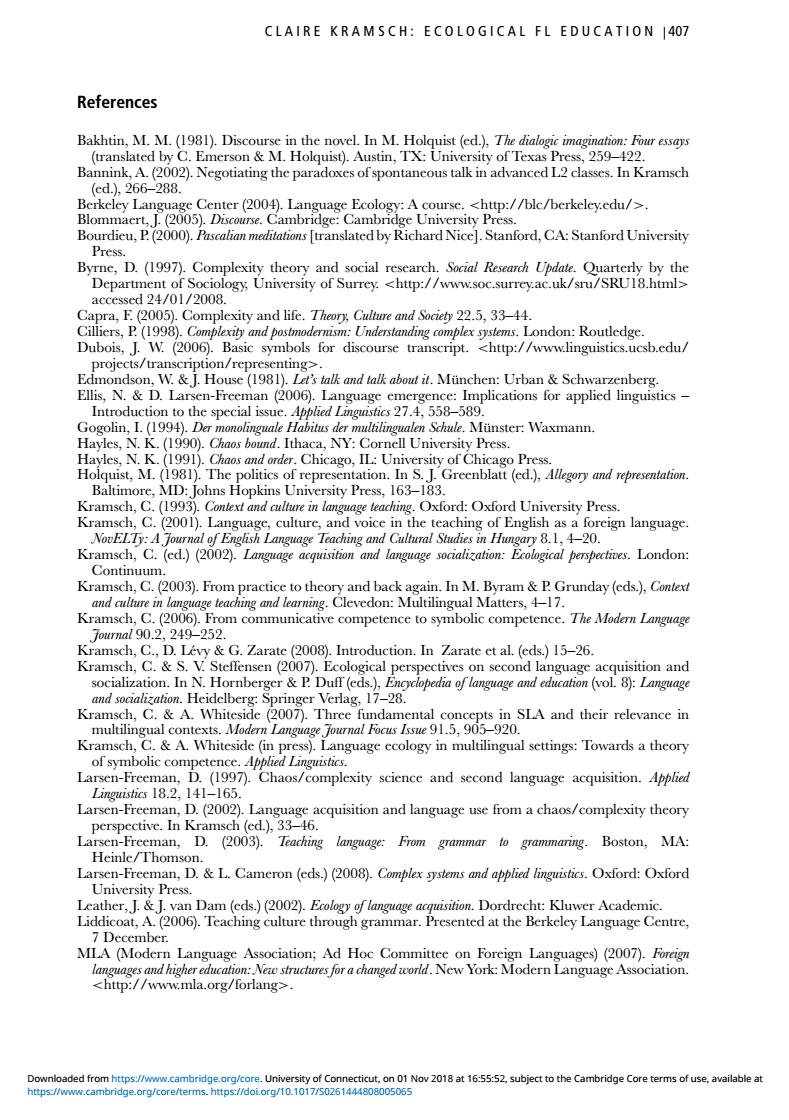正在加载图片...

CLAIRE KRAMSCH:ECOLOGICAL FL EDUCATION 407 References Bannink00).Negotiating the paradocs of pontncoustakancdKramch Cen Ecole Blommacrt,(200 <http://blc/berkelcy.edu/> Bourdieu,P(00).[ranslated by Richard Nice c.D.(19Complexity hcory and htwwsoc surre /01/2008 ogy,University of Surrey. csb edu Introduction to the special issue.558 funster:Waxmann teaching.Oxford:Oxford University Press as 2 cign language me0Pa报 T n. m&P Grunday (eds.),Context Language A时心一 Vedlag 17-28 Kra msch.C.A.Whites Kramsch,C.A.Whiteside (in press).Language ecology in multilingual settings:Towards a theory h18.21416 and nguage u from chao/compexity theory Heinle/Thoms ber http://www.mla.org/forlang CLAIRE KRAMSCH: ECOLOGICAL FL EDUCATION 407 References Bakhtin, M. M. (1981). Discourse in the novel. In M. Holquist (ed.), The dialogic imagination: Four essays (translated by C. Emerson & M. Holquist). Austin, TX: University of Texas Press, 259–422. Bannink, A. (2002). Negotiating the paradoxes of spontaneous talk in advanced L2 classes. In Kramsch (ed.), 266–288. Berkeley Language Center (2004). Language Ecology: A course. <http://blc/berkeley.edu/>. Blommaert, J. (2005). Discourse. Cambridge: Cambridge University Press. Bourdieu, P. (2000). Pascalian meditations [translated by Richard Nice]. Stanford, CA: Stanford University Press. Byrne, D. (1997). Complexity theory and social research. Social Research Update. Quarterly by the Department of Sociology, University of Surrey. <http://www.soc.surrey.ac.uk/sru/SRU18.html> accessed 24/01/2008. Capra, F. (2005). Complexity and life. Theory, Culture and Society 22.5, 33–44. Cilliers, P. (1998). Complexity and postmodernism: Understanding complex systems. London: Routledge. Dubois, J. W. (2006). Basic symbols for discourse transcript. <http://www.linguistics.ucsb.edu/ projects/transcription/representing>. Edmondson, W. & J. House (1981). Let’s talk and talk about it. Munchen: Urban & Schwarzenberg. ¨ Ellis, N. & D. Larsen-Freeman (2006). Language emergence: Implications for applied linguistics – Introduction to the special issue. Applied Linguistics 27.4, 558–589. Gogolin, I. (1994). Der monolinguale Habitus der multilingualen Schule. Munster: Waxmann. ¨ Hayles, N. K. (1990). Chaos bound. Ithaca, NY: Cornell University Press. Hayles, N. K. (1991). Chaos and order. Chicago, IL: University of Chicago Press. Holquist, M. (1981). The politics of representation. In S. J. Greenblatt (ed.), Allegory and representation. Baltimore, MD: Johns Hopkins University Press, 163–183. Kramsch, C. (1993). Context and culture in language teaching. Oxford: Oxford University Press. Kramsch, C. (2001). Language, culture, and voice in the teaching of English as a foreign language. NovELTy: A Journal of English Language Teaching and Cultural Studies in Hungary 8.1, 4–20. Kramsch, C. (ed.) (2002). Language acquisition and language socialization: Ecological perspectives. London: Continuum. Kramsch, C. (2003). From practice to theory and back again. In M. Byram & P. Grunday (eds.), Context and culture in language teaching and learning. Clevedon: Multilingual Matters, 4–17. Kramsch, C. (2006). From communicative competence to symbolic competence. The Modern Language Journal 90.2, 249–252. Kramsch, C., D. Levy & G. Zarate (2008). Introduction. In Zarate et al. (eds.) 15–26. ´ Kramsch, C. & S. V. Steffensen (2007). Ecological perspectives on second language acquisition and socialization. In N. Hornberger & P. Duff (eds.), Encyclopedia of language and education (vol. 8): Language and socialization. Heidelberg: Springer Verlag, 17–28. Kramsch, C. & A. Whiteside (2007). Three fundamental concepts in SLA and their relevance in multilingual contexts. Modern Language Journal Focus Issue 91.5, 905–920. Kramsch, C. & A. Whiteside (in press). Language ecology in multilingual settings: Towards a theory of symbolic competence. Applied Linguistics. Larsen-Freeman, D. (1997). Chaos/complexity science and second language acquisition. Applied Linguistics 18.2, 141–165. Larsen-Freeman, D. (2002). Language acquisition and language use from a chaos/complexity theory perspective. In Kramsch (ed.), 33–46. Larsen-Freeman, D. (2003). Teaching language: From grammar to grammaring. Boston, MA: Heinle/Thomson. Larsen-Freeman, D. & L. Cameron (eds.) (2008). Complex systems and applied linguistics. Oxford: Oxford University Press. Leather, J. & J. van Dam (eds.) (2002). Ecology of language acquisition. Dordrecht: Kluwer Academic. Liddicoat, A. (2006). Teaching culture through grammar. Presented at the Berkeley Language Centre, 7 December. MLA (Modern Language Association; Ad Hoc Committee on Foreign Languages) (2007). Foreign languages and higher education: New structures for a changed world. New York: Modern Language Association. <http://www.mla.org/forlang>. https://www.cambridge.org/core/terms. https://doi.org/10.1017/S0261444808005065 Downloaded from https://www.cambridge.org/core. University of Connecticut, on 01 Nov 2018 at 16:55:52, subject to the Cambridge Core terms of use, available at